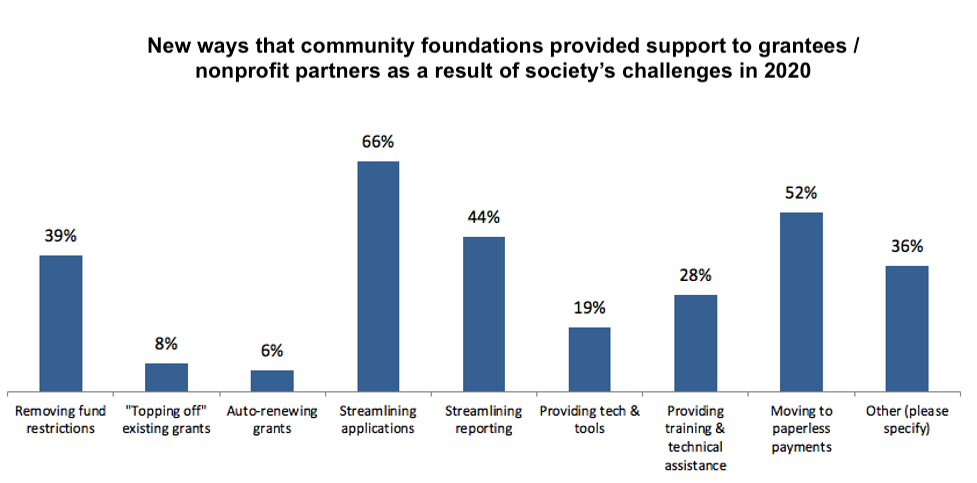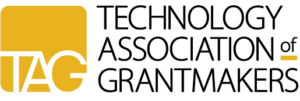by Lucas Cherry, CEO of Give Interactive and TAG member
Tumultuous and terrifying. Resilient and hopeful. There is no simple way to compose a 2020 year in review. So, if you are kicking off the new year in a flurry of mixed emotions, please know you are not alone!
The pressures and challenges of 2020 impacted each industry differently. Some entities had record levels of activity while others screeched to a halt. As a group, Community Foundations were surely right in the middle of the mess, experiencing both highs and lows.
I’m writing this as a Community Foundation executive. I was formerly Executive VP at The Signatry Foundation and now CEO of Give Interactive, a software provider to community foundations. As a member of the Technology Association of Grantmakers (TAG), I am grateful to have served alongside you in 2020 as we responded to our communities’ needs. As we enter a new year, we have the opportunity to pause, take a deep breath, and celebrate the impressive response of Community Foundations in North America.
As you undoubtedly recall, in the early days of the COVID-19 pandemic, many community foundations were called on to be rapid “first responders” to the crises at hand. We were seen mobilizing people, organizations, and resources to meet critical and immediate needs. Stories from throughout North America exemplified unprecedented grant writing volume, new program creation, and crowdfunded collaborations. All the while, we were moving our entire organizations to remote work and paperless grantmaking, wrangling IT security challenges, and juggling personal demands. There were babies in Zoom meetings, cats on our keyboards, kids schooling at kitchen tables, and quarantines requiring masks and social distancing. It was messy, to say the least.
It’s worth taking a moment to celebrate the vital role that community foundations played over the past year, so allow me to highlight the work of two peer organizations willing to share their story.
Pandemic Response in the Carolinas
In the Carolinas, the COVID-19 lockdown hit small businesses and their employees hard. Local governments found themselves with funding on hand to support the community but they lacked the ability to get dollars directly into the hands of the businesses. After decades of faithful service to their community, Foundation For The Carolinas (FFTC) was called upon by their local government to serve as an intermediary to distribute funds.
According to Nikhil Sawant, Executive VP, Business Services, Chief Information Officer, and member of the TAG Board of Directors, FFTC rapidly created new application processes and creatively tapped into a pool of furloughed staff from YMCAs to serve as their customer service team. To ensure fair and equitable access to the available resources, the team created nine temporary financial assistance triage centers across the community. Over 100 people came together to distribute over $40 million in emergency funding to 3,000 small businesses and their employees.
The IT team at FFTC played a critical role in the success of their response. The team worked tirelessly to roll out new functionality within their grants management platform, modifying processes to allow a large volume of external reviewers of applicants. To keep up with all the influx of traffic, the team built out business intelligence dashboards with heat maps around the city to ensure equitable distribution of financial assistance to all corners of the community. All the while, the IT team sacrificed as true first responders by remaining in their office to maintain on-site technical support for the rapid response. Congratulations are due for their ingenuity and tenacity.
“Inclusive City” Initiative in Indianapolis
Meanwhile, a few states over, the Central Indiana Community Foundation (CICF) also rallied their team to respond to another crisis of 2020: important calls for racial justice. In the midst of the tension, midwestern regional leaders turned to CICF to convene thought leadership and resources. As a result, CICF launched the first “Inclusive City” initiative.
CICF worked swiftly to release a detailed plan with funding opportunities to create and motivate a grassroots anti-racist movement in Central Indiana, resulting an outpouring of support for the initiative. CICF quickly deployed the project across the region, requiring swift changes to technology and communication platforms. The IT department led by TAG member, David Donaldson, stepped up to the challenge.
David had already led his organization through a swift transition to remote work while completely shifting the operating structure of the team. In March, his team turned around their “IT Pandemic Policy” within 8 hours, bolstering their training support to enable all staff to successfully manage their new home offices.
But that wasn’t their team’s only assignment. Soon they had the opportunity to pivot from a focus on internal support to external communication deployment. Multitasking was a necessity. They streamed the Inclusive City event in partnership with regional television stations while also holding multiple virtual donor events. As David recalled, “We hit the ground running that Monday in March and haven’t stopped since! Our team could have easily gone home and done the status quo, pushing off the external needs until we were back to a normal state. But they didn’t. We were able to have incredible influence in the midst of a trying time. That we are proud of.”
2020 Response Across Community Foundations
These stories are hardly unique. From east to west across North America, TAG members have shared the creative ways their Community Foundation has responded to the unique challenges of 2020 including increased grantmaking for IT and general operating support, expedited grant disbursements, offered IT services to grantees and created many COVID response funds.
The 2020 State of Philanthropy Tech survey highlights the prominence of trends among Community Foundation respondents:

No doubt, it has been a hard year. Yet as many of our teams are struggling with fatigue and work-life balance, we can celebrate. This is the time for each of us as leaders and teammates to reflect on 2020’s struggles and victories. Perhaps it is comforting to realize that messy and different are sometimes okay for a season. If we are patient, our communities will reinvent themselves and emerge from the rubble stronger and more determined.
The world needs the work of Community Foundations now more than ever before. Together we can link arms and charge into the unknown adventure of 2021 sobered yet optimistic and empowered. After all, we are the survivors of 2020.
About the Author

Lucas Cherry is the CEO of Give Interactive, a former Executive VP at The Signatry Foundation, a TAG member and volunteer with the 2020 TAG Survey Committee.
